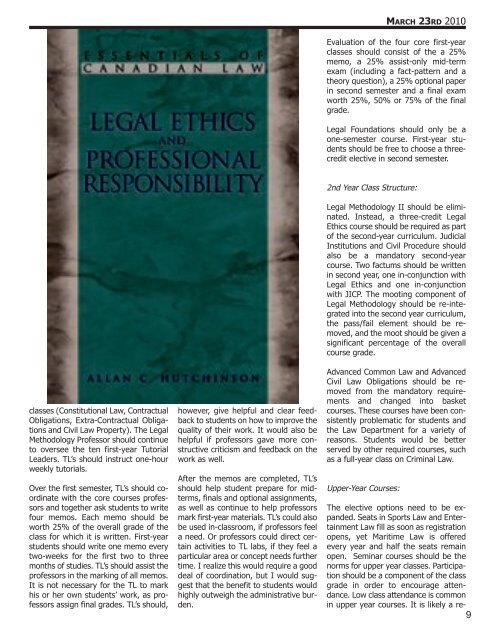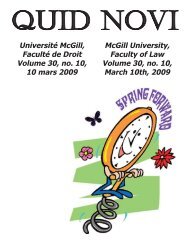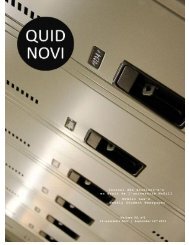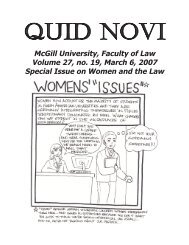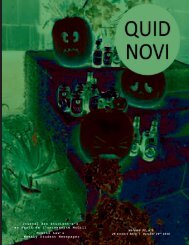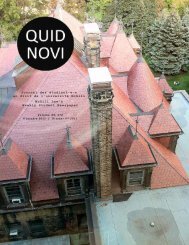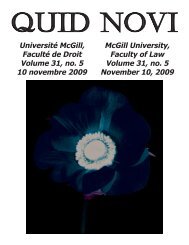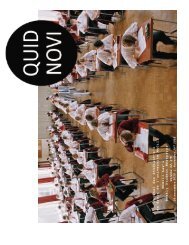March 23, 2010
March 23, 2010
March 23, 2010
You also want an ePaper? Increase the reach of your titles
YUMPU automatically turns print PDFs into web optimized ePapers that Google loves.
MARCH <strong>23</strong>RD <strong>2010</strong><br />
Evaluation of the four core first-year<br />
classes should consist of the a 25%<br />
memo, a 25% assist-only mid-term<br />
exam (including a fact-pattern and a<br />
theory question), a 25% optional paper<br />
in second semester and a final exam<br />
worth 25%, 50% or 75% of the final<br />
grade.<br />
Legal Foundations should only be a<br />
one-semester course. First-year students<br />
should be free to choose a threecredit<br />
elective in second semester.<br />
classes (Constitutional Law, Contractual<br />
Obligations, Extra-Contractual Obligations<br />
and Civil Law Property). The Legal<br />
Methodology Professor should continue<br />
to oversee the ten first-year Tutorial<br />
Leaders. TL’s should instruct one-hour<br />
weekly tutorials.<br />
Over the first semester, TL’s should coordinate<br />
with the core courses professors<br />
and together ask students to write<br />
four memos. Each memo should be<br />
worth 25% of the overall grade of the<br />
class for which it is written. First-year<br />
students should write one memo every<br />
two-weeks for the first two to three<br />
months of studies. TL’s should assist the<br />
professors in the marking of all memos.<br />
It is not necessary for the TL to mark<br />
his or her own students’ work, as professors<br />
assign final grades. TL’s should,<br />
however, give helpful and clear feedback<br />
to students on how to improve the<br />
quality of their work. It would also be<br />
helpful if professors gave more constructive<br />
criticism and feedback on the<br />
work as well.<br />
After the memos are completed, TL’s<br />
should help student prepare for midterms,<br />
finals and optional assignments,<br />
as well as continue to help professors<br />
mark first-year materials. TL’s could also<br />
be used in-classroom, if professors feel<br />
a need. Or professors could direct certain<br />
activities to TL labs, if they feel a<br />
particular area or concept needs further<br />
time. I realize this would require a good<br />
deal of coordination, but I would suggest<br />
that the benefit to students would<br />
highly outweigh the administrative burden.<br />
2nd Year Class Structure:<br />
Legal Methodology II should be eliminated.<br />
Instead, a three-credit Legal<br />
Ethics course should be required as part<br />
of the second-year curriculum. Judicial<br />
Institutions and Civil Procedure should<br />
also be a mandatory second-year<br />
course. Two factums should be written<br />
in second year, one in-conjunction with<br />
Legal Ethics and one in-conjunction<br />
with JICP. The mooting component of<br />
Legal Methodology should be re-integrated<br />
into the second year curriculum,<br />
the pass/fail element should be removed,<br />
and the moot should be given a<br />
significant percentage of the overall<br />
course grade.<br />
Advanced Common Law and Advanced<br />
Civil Law Obligations should be removed<br />
from the mandatory requirements<br />
and changed into basket<br />
courses. These courses have been consistently<br />
problematic for students and<br />
the Law Department for a variety of<br />
reasons. Students would be better<br />
served by other required courses, such<br />
as a full-year class on Criminal Law.<br />
Upper-Year Courses:<br />
The elective options need to be expanded.<br />
Seats in Sports Law and Entertainment<br />
Law fill as soon as registration<br />
opens, yet Maritime Law is offered<br />
every year and half the seats remain<br />
open. Seminar courses should be the<br />
norms for upper year classes. Participation<br />
should be a component of the class<br />
grade in order to encourage attendance.<br />
Low class attendance is common<br />
in upper year courses. It is likely a re-<br />
9


